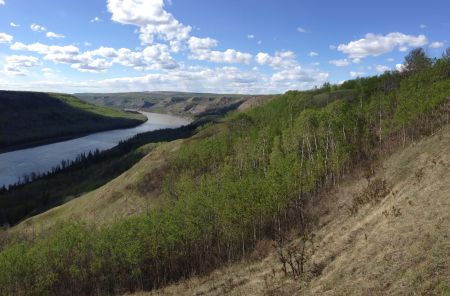Can you want to tell us about yourself and your involvement in the Rocky Mountain Fort Camp?
My name is Helen Knott. I’m a Dane Zaa and Cree woman, of Denee Tsaa First Nation (Prophet River First Nation), from Treaty 8 territory, located in northeast B.C. We started occupying the Rocky Mountain Fort (RMF) where BC Hydro has planned to clear-cut. Currently, there are three court cases against this clearing and against the Site C Hydro Dam project that are going to be heard in the spring. It seems as if BC Hydro is pushing to get as much work done as possible so in court they’ll be able to say they already invested work and money into the project.
Some say the river will regenerate from the dam as it has in the past. What do you think?
We’ve already lost so many species of fish from the past two dams. Now you can only eat one fish out of that river a month because of the high mercury levels. When they flooded the Williston, the Tsay Keh Dene were flooded out of their homes. The river was their main passageway and they had family ties with some communities that have been completely severed.
BC Hydro also says, “You’re going to have a beach, a big lake, and lake shore property.” However, the Tsay Keh Dene have a lot of asthma problems related to dust from the beach that was formed by the dam. I think two dams are enough for one river and for one area. I don’t see why there has to be any more losses incurred.
Do you have anything else to add about the environmental impacts of the dam?
The Peace Valley is a migratory corridor. With all the oil and gas development in this area, a lot of animal habitat has already been lost. I saw footage of the first dam that they built of wildlife trying to cross and drowning in the process. There are some communities here that rely heavily on hunting and trapping. I know 14 year olds that trap for extra money, or 16 year olds who trap rabbits for their grandmothers. It’s our lifestyle up here.
For you, what do you feel is at the core of the conflict?
I think the root of this conflict is not being heard, especially in this region where this dam project has been proposed and shut down twice already. One of the things that we’ve been calling for is the BC Utilities Commission Review. In 2010, Site C was pushed forward without this review. When you see processes that are supposed to protect people get vetoed for projects like these, you think, “Is this really in the people’s best interest?” I really feel BC Hydro was spared the process because it would be rejected. It is a costly dam, estimated at 9 billion dollars, and BC doesn’t even need the energy.
Can you talk a bit about your day-to-day in terms of how you’re able to balance your life as a social worker and mother, with all of your commitments to the camp?
It’s about trying to keep on top of things. Even when I have a day off that’s supposed to be self-care, I usually have two or three interviews to do, or something media-based like updating the camp’s sites or pages. Plus, I have a son who has piano and swimming lessons, who needs my time and attention. People tend to have this idea that people who are a part of these occupations don’t have jobs. A lot of us do and we probably work a lot harder than the average person to make this happen.
Is there anything else you’d like to add?
This project is supposed to bring in a lot of workers to the region and our community has already experienced the ramifications of having a large transient worker population, due to the oil and gas industry in the region. In 2014, a study called the Peace Project identified correlations between the substance use by transient worker populations, increased rates of crime, and increased rates of violence against women in the region. They found a high percentage of the women who have gone missing or been murdered are Indigenous. There is a correlation between the violation of Indigenous land and the continued violation of Indigenous women. As an Indigenous woman who has experienced violence as a result of being in this region, and as a young mom with many young cousins and girls in my family, I fear for them.
Editorial update on the camp:
On February 29th, 2016, a BC Supreme Court judge, Bruce Butler, granted an injunction against the camp to BC Hydro. After camping for 62 days in the middle of winter, RMF camp was quietly dismantled, but campers have stated they will not cease in their opposition to the dam. More resistance is expected and encouraged.



